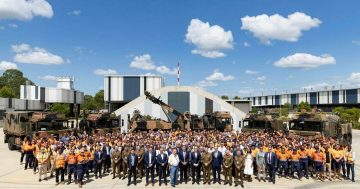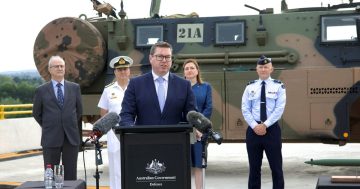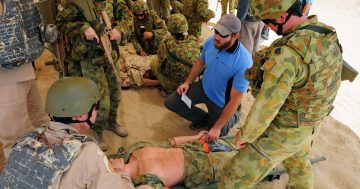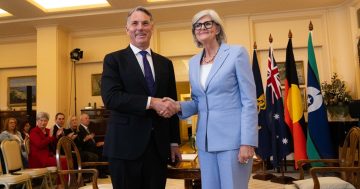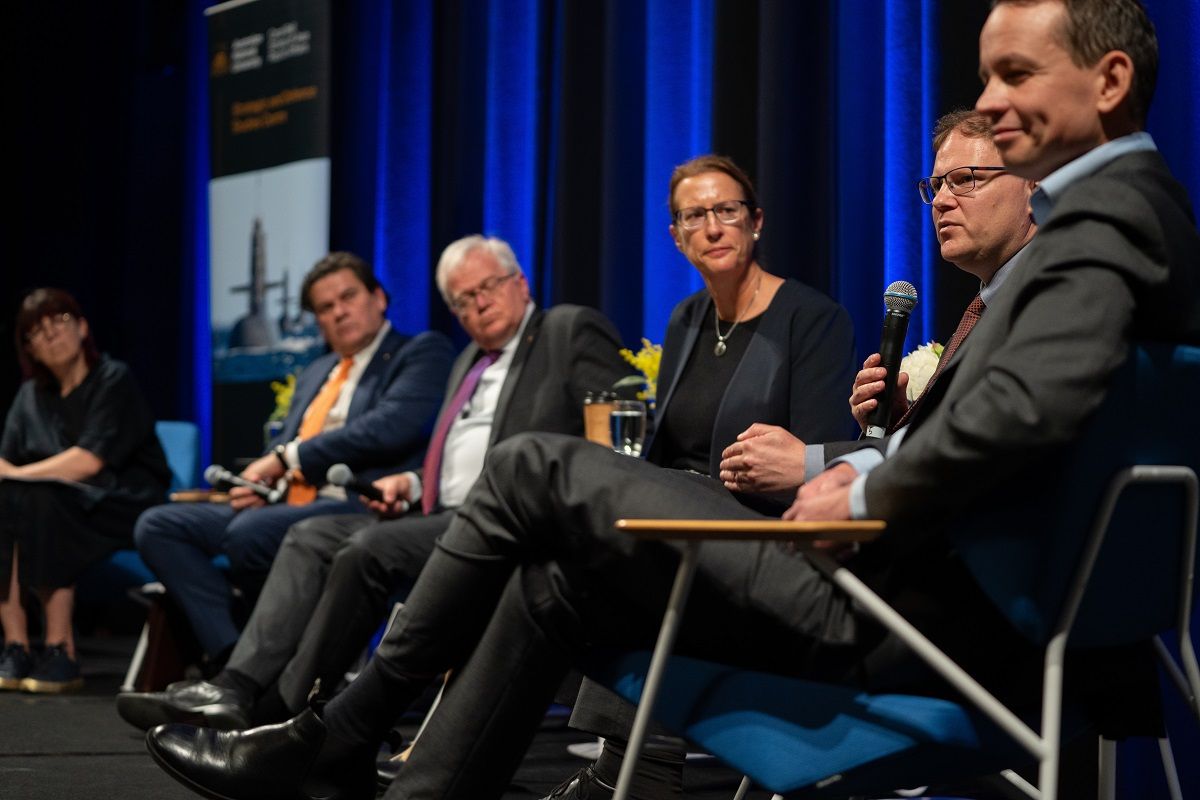
At the report’s release on 18 December are (from left) Dean of the ANU College of Asia & the Pacific Professor Helen Sullivan, Ai Group CEO Innes Willox, ANU Vice-Chancellor Professor Brian Schmidt, Ai Group Defence Council executive director Kate Louis and SDSC’s Professor Stephan Fruhling. Photo: ANU.
A report jointly compiled by the Australian Industry Group (Ai Group) and the Australian National University’s Strategic and Defence Studies Centre (SDSC) says Australia’s defence industry is not given the recognition it deserves as a national capability.
The report titled Defence Industry in National Defence: Rethinking the future of Australian defence industry policy was supported by the Department of Defence strategic policy grants program.
It studied five peer nations – Sweden, France, the UK, Israel and Canada – to see how their governments recognise the value of their defence industries and the role they play in developing national capabilities. It says the case studies offer lessons on how defence industry policy can be implemented in different strategic contexts.
It found that, while Australia’s Defence Strategic Review (DSR), released in April, argued for the need to build sovereign defence capabilities in key areas, the current paradigm of defence industry policy was established in a vastly different context to that of today, when risks of major conflict were low.
It says the policy at that time assumed a 10-year warning time, and defence industry capability was viewed largely in terms of supporting individual ADF programs.
“As our geostrategic environment deteriorates, the Australian Government has adopted the concept of National Defence – the defence against potential threats arising from major power competition – as a new approach to defence planning and strategy,” the report’s executive summary says.
The report says a change is required to recognise that, rather than supporting capabilities on a case-by-case basis, an Australian defence industry is a national capability on its own, not just a capability input. It says the possession of a sovereign but internationally linked defence industry is a distinct asset during a period when the risk of major conflict is rising.
With this in mind, the report made five major recommendations:
- The Australian defence industry should be considered a capability in its own right and not just an input.
- Defence industry should be embedded within and managed as part of Australia’s broader national industry structure and policy.
- Defence industries should be strategically prioritised, then supported to achieve scale and surge capabilities.
- Government should utilise the full range of policy levers at its disposal to shape defence industry outcomes.
- Government should establish a Defence Industry Capability Manager to define the capability and capacity that it needs to develop to assist industry to meet the level of preparedness determined by the government.
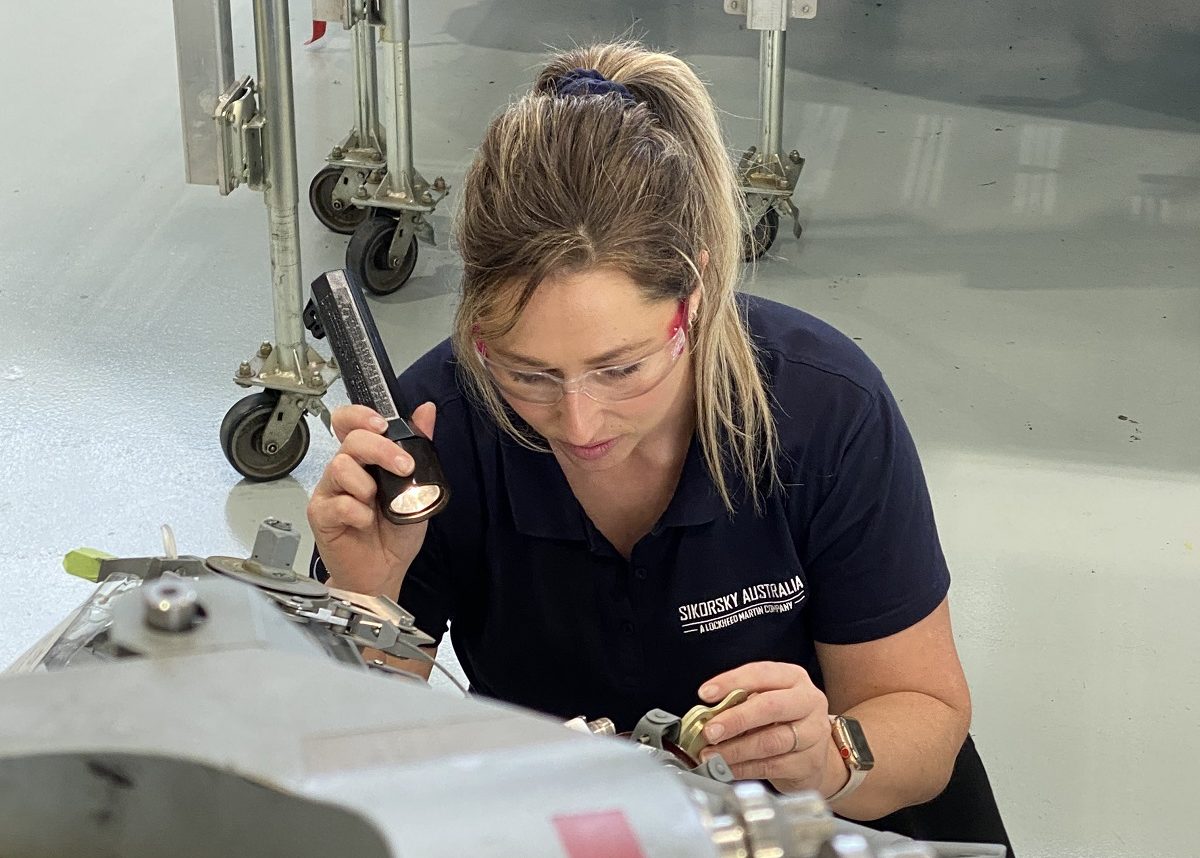
The report says the defence industry needs to be recognised as a national capability. Photo: Sikorsky Australia.
Ai Group chief executive Innes Willox said: ”This new research maps out a path for Australia to identify the priority defence industry capabilities we need to have locally, a method for building those capabilities to scale using the broad suite of industry policy tools and stronger government-business collaboration.
“The major question that Australia’s National Defence Strategy should be considering is how to ensure we have the capability – in terms of infrastructure, skills and intellectual property – to supply critical defence goods in Australia.
“Both international primes and local businesses in defence and the defence supply chain are critical to achieving that ambition. We need to build joined-up supply chains including both to deliver that capability more quickly and at larger scale.
“A key problem this report seeks to address is a lack of coordination across many layers and dimensions of government and industry. A strong recommendation to address this shortcoming is the appointment of an Industry Capability Manager (ICM). If we need coordination, then there’s got to be a defence industry czar, and the ICM is it.”
SDSC’s Professor Stephan Fruhling added: “The conflict in Ukraine has demonstrated once again the importance of a defence industrial base that can surge and adapt, not just to support but also to reconstitute, expand and provide new capabilities during conflict.
“Other countries have built and manage their defence industrial bases as national assets for threatening times, and so can and should Australia.”
The full report can be read here.
Original Article published by Andrew McLaughlin on Riotact.



